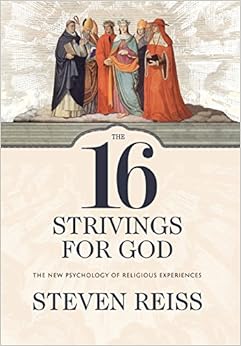
The Sixteen Strivings for God – The New Psychology of Religious Experiences by Steven Reiss
Humanists, and non-theists in general, are often puzzled by the ability of otherwise intelligent people to believe in nonsense. This new book by Steven Reiss offers powerful insights into why people adopt religious beliefs. Reiss identifies, from empirical research, sixteen basic human desires which can be fulfilled in differing degrees by various types of religious belief.
The list of sixteen basic desires contains nothing surprising (everything from the desire for food to the need for order) but what distinguishes his approach is the way in which it can be mapped onto religions. Earlier theories tend to concentrate on a small number of motivators (such as concern about death or need for community) but Reiss offers a comprehensive range of desires and argues convincingly that the majority of them can be satisfied by all the major world religions. Accordingly people adopt the type of belief that, in the context of their personal circumstances, meets the desires most strongly manifested in their characters. Indeed the contradictions in the major religions are necessary to accommodate a range of characters – people pick and mix the bits that best fit with their own strongest and weakest desires.
Less convincingly, Reiss claims that his position is ‘theologically neutral’ because knowing god would have to be related to human desire. This comes across as a rather weak attempt at apologetics -perhaps necessary for an American academic cornered by the power of his own insights. Clearly his theory does not disprove the existence of god but it does offer an explanation for religious behaviour without the need for supernatural complexity. As Occam would say, the simpler explanation is more likely to be correct.
Interestingly, based on Reiss’s own analysis, we can predict that religious believers will not be very bothered by Occam as long as their religion meets their own desires.
For this reviewer the most remarkable feature is that the list of desires does not contain anything that clearly relates to a desire for truth or evidence or the use of reason. The closest is ‘Curiosity’ but Reiss suggests that this can be satisfied by a study of theology. So the result is religious belief is motivated by basic desires and with little concern for truth. This is exactly what is observed – we have all noted that concern for truth is easily put aside amid a fog of irrational arguments and dodgy historical ‘facts’. Humanists, with a concern for evidence, truth and reason simply cannot fit into the religious part of the model.
This leaves us with a picture of religious belief as an essentially selfish phenomenon that satisfies whatever combination of basic desires is most dominant – even in cases where the dominant desires manifest in positive outcomes. And the outcomes do not have to be positive – the list of desires does not include Truth but it does include Status, Power and Vengeance. This is indeed a theory that fits the facts.